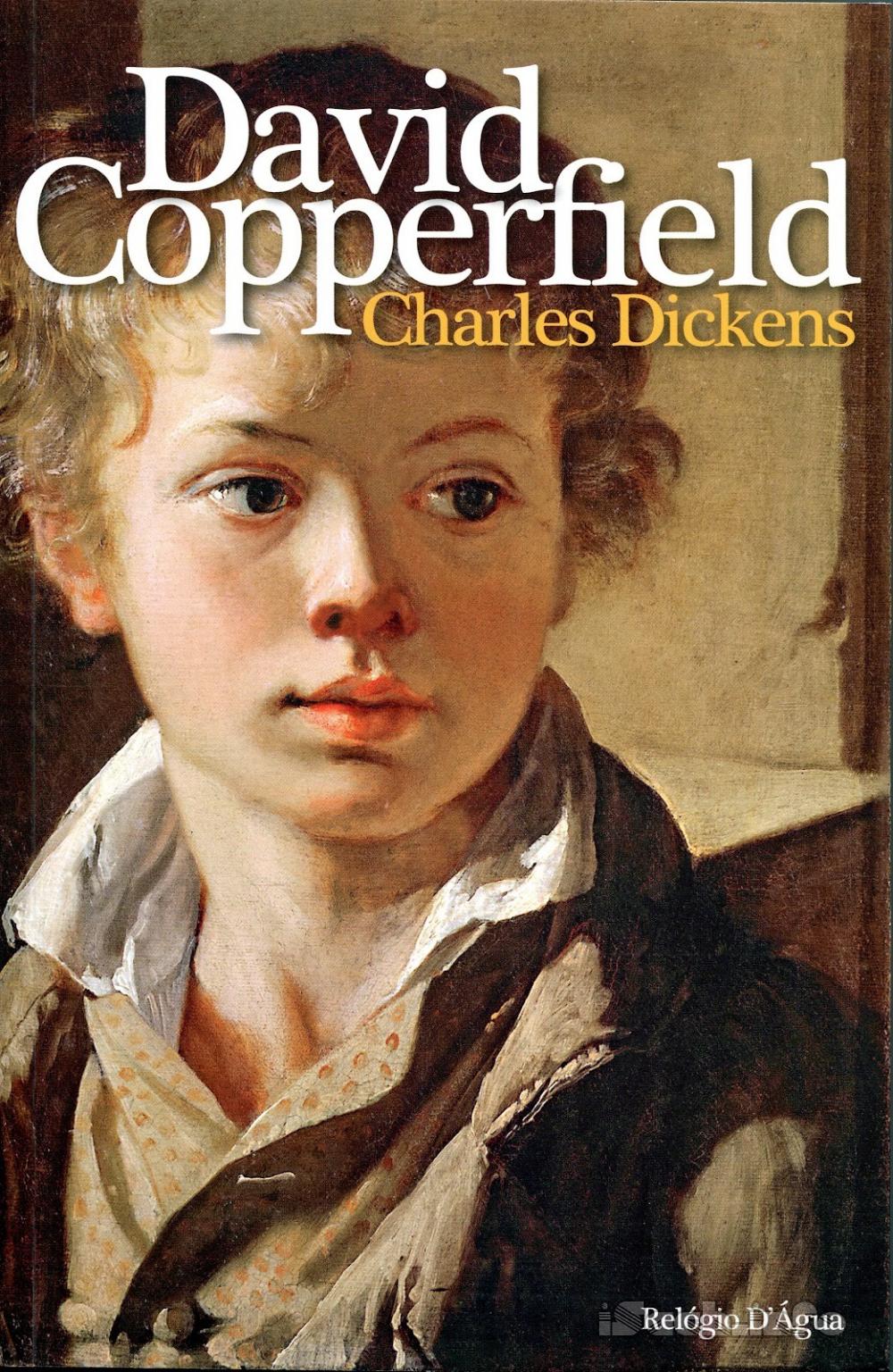Chapter 64: A Last Retrospect
A
nd now my written story ends. I look back, once more—for the last time—before I close these leaves.I see myself, with Agnes at my side, journeying along the road of life. I see our children and our friends around us; and I hear the roar of many voices, not indifferent to me as I travel on.
What faces are the most distinct to me in the fleeting crowd? Lo, these; all turning to me as I ask my thoughts the question!
Here is my aunt, in stronger spectacles, an old woman of four-score years and more, but upright yet, and a steady walker of six miles at a stretch in winter weather.
Always with her, here comes Peggotty, my good old nurse, likewise in spectacles, accustomed to do needle-work at night very close to the lamp, but never sitting down to it without a bit of wax candle, a yard-measure in a little house, and a work-box with a picture of St. Paul's upon the lid.
The cheeks and arms of Peggotty, so hard and red in my childish days, when I wondered why the birds didn't peck her in preference to apples, are shrivelled now; and her eyes, that used to darken their whole neighbourhood in her face, are fainter (though they glitter still); but her rough forefinger, which I once associated with a pocket nutmeg-grater, is just the same, and when I see my least child catching at it as it totters from my aunt to her, I think of our little parlour at home, when I could scarcely walk. My aunt's old disappointment is set right, now. She is godmother to a real living Betsey Trotwood; and Dora (the next in order) says she spoils her.
There is something bulky in Peggotty's pocket. It is nothing smaller than the Crocodile Book, which is in rather a dilapidated condition by this time, with divers of the leaves torn and stitched across, but which Peggotty exhibits to the children as a precious relic. I find it very curious to see my own infant face, looking up at me from the Crocodile stories; and to be reminded by it of my old acquaintance Brooks of Sheffield.
Among my boys, this summer holiday time, I see an old man making giant kites, and gazing at them in the air, with a delight for which there are no words. He greets me rapturously, and whispers, with many nods and winks, 'Trotwood, you will be glad to hear that I shall finish the Memorial when I have nothing else to do, and that your aunt's the most extraordinary woman in the world, sir!'
Who is this bent lady, supporting herself by a stick, and showing me a countenance in which there are some traces of old pride and beauty, feebly contending with a querulous, imbecile, fretful wandering of the mind? She is in a garden; and near her stands a sharp, dark, withered woman, with a white scar on her lip. Let me hear what they say.
'Rosa, I have forgotten this gentleman's name.'
Rosa bends over her, and calls to her, 'Mr. Copperfield.'
'I am glad to see you, sir. I am sorry to observe you are in mourning. I hope Time will be good to you.'
Her impatient attendant scolds her, tells her I am not in mourning, bids her look again, tries to rouse her.
'You have seen my son, sir,' says the elder lady. 'Are you reconciled?'
Looking fixedly at me, she puts her hand to her forehead, and moans. Suddenly, she cries, in a terrible voice, 'Rosa, come to me. He is dead!' Rosa kneeling at her feet, by turns caresses her, and quarrels with her; now fiercely telling her, 'I loved him better than you ever did!'—now soothing her to sleep on her breast, like a sick child. Thus I leave them; thus I always find them; thus they wear their time away, from year to year.
What ship comes sailing home from India, and what English lady is this, married to a growling old Scotch Croesus with great flaps of ears? Can this be Julia Mills?
Indeed it is Julia Mills, peevish and fine, with a black man to carry cards and letters to her on a golden salver, and a copper-coloured woman in linen, with a bright handkerchief round her head, to serve her Tiffin in her dressing-room. But Julia keeps no diary in these days; never sings Affection's Dirge; eternally quarrels with the old Scotch Croesus, who is a sort of yellow bear with a tanned hide. Julia is steeped in money to the throat, and talks and thinks of nothing else. I liked her better in the Desert of Sahara.
Or perhaps this IS the Desert of Sahara! For, though Julia has a stately house, and mighty company, and sumptuous dinners every day, I see no green growth near her; nothing that can ever come to fruit or flower. What Julia calls 'society', I see; among it Mr. Jack Maldon, from his Patent Place, sneering at the hand that gave it him, and speaking to me of the Doctor as 'so charmingly antique'. But when society is the name for such hollow gentlemen and ladies, Julia, and when its breeding is professed indifference to everything that can advance or can retard mankind, I think we must have lost ourselves in that same Desert of Sahara, and had better find the way out.
And lo, the Doctor, always our good friend, labouring at his Dictionary (somewhere about the letter D), and happy in his home and wife. Also the Old Soldier, on a considerably reduced footing, and by no means so influential as in days of yore!
Working at his chambers in the Temple, with a busy aspect, and his hair (where he is not bald) made more rebellious than ever by the constant friction of his lawyer's-wig, I come, in a later time, upon my dear old Traddles. His table is covered with thick piles of papers; and I say, as I look around me:
'If Sophy were your clerk, now, Traddles, she would have enough to do!'
'You may say that, my dear Copperfield! But those were capital days, too, in Holborn Court! Were they not?'
'When she told you you would be a judge? But it was not the town talk then!'
'At all events,' says Traddles, 'if I ever am one—' 'Why, you know you will be.'
'Well, my dear Copperfield, WHEN I am one, I shall tell the story, as I said I would.'
We walk away, arm in arm. I am going to have a family dinner with Traddles. It is Sophy's birthday; and, on our road, Traddles discourses to me of the good fortune he has enjoyed.
'I really have been able, my dear Copperfield, to do all that I had most at heart. There's the Reverend Horace promoted to that living at four hundred and fifty pounds a year; there are our two boys receiving the very best education, and distinguishing themselves as steady scholars and good fellows; there are three of the girls married very comfortably; there are three more living with us; there are three more keeping house for the Reverend Horace since Mrs. Crewler's decease; and all of them happy.'
'Except—' I suggest.
'Except the Beauty,' says Traddles. 'Yes. It was very unfortunate that she should marry such a vagabond. But there was a certain dash and glare about him that caught her. However, now we have got her safe at our house, and got rid of him, we must cheer her up again.'
Traddles's house is one of the very houses—or it easily may have been—which he and Sophy used to parcel out, in their evening walks. It is a large house; but Traddles keeps his papers in his dressing-room and his boots with his papers; and he and Sophy squeeze themselves into upper rooms, reserving the best bedrooms for the Beauty and the girls. There is no room to spare in the house; for more of 'the girls' are here, and always are here, by some accident or other, than I know how to count. Here, when we go in, is a crowd of them, running down to the door, and handing Traddles about to be kissed, until he is out of breath. Here, established in perpetuity, is the poor Beauty, a widow with a little girl; here, at dinner on Sophy's birthday, are the three married girls with their three husbands, and one of the husband's brothers, and another husband's cousin, and another husband's sister, who appears to me to be engaged to the cousin. Traddles, exactly the same simple, unaffected fellow as he ever was, sits at the foot of the large table like a Patriarch; and Sophy beams upon him, from the head, across a cheerful space that is certainly not glittering with Britannia metal.
And now, as I close my task, subduing my desire to linger yet, these faces fade away. But one face, shining on me like a Heavenly light by which I see all other objects, is above them and beyond them all. And that remains.
I turn my head, and see it, in its beautiful serenity, beside me.
My lamp burns low, and I have written far into the night; but the dear presence, without which I were nothing, bears me company.
O Agnes, O my soul, so may thy face be by me when I close my life indeed; so may I, when realities are melting from me, like the shadows which I now dismiss, still find thee near me, pointing upward!



 ePub
ePub A4
A4